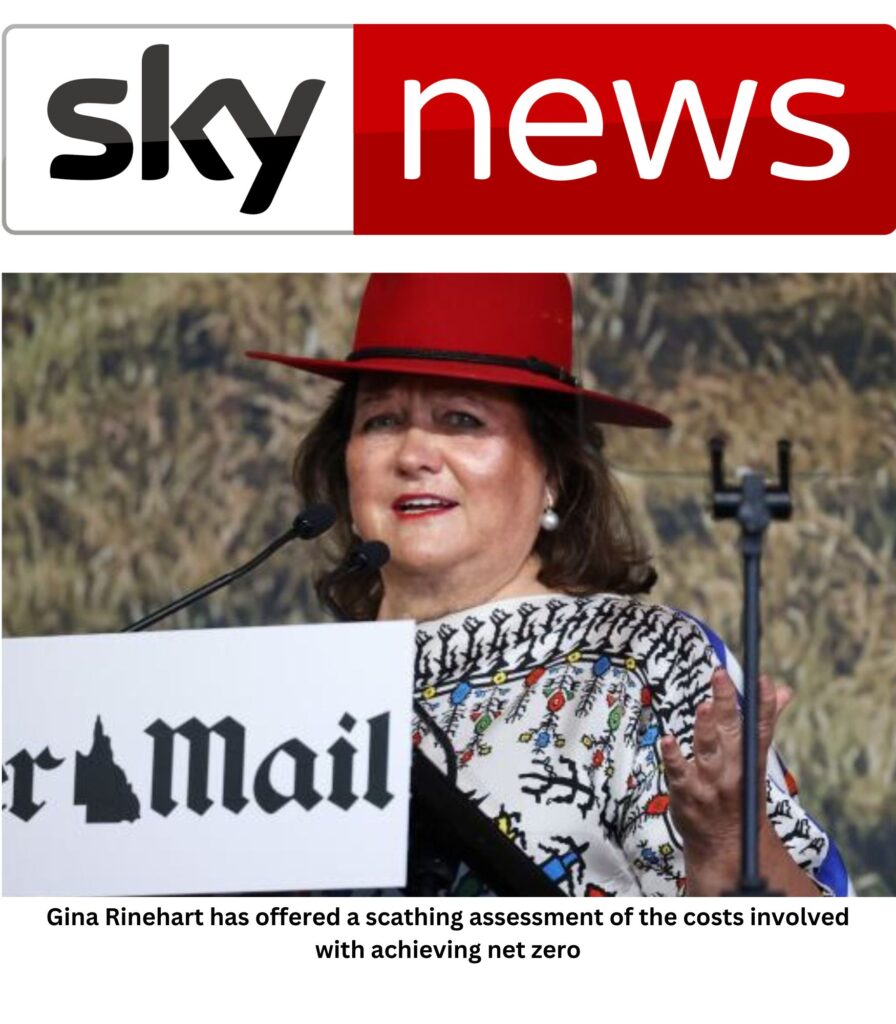
Article by Joseph Huitson courtesy of Sky news.
Gina Rinehart has offered a scathing assessment of the costs involved with achieving net zero at a regional summit, warning of the dire consequences for the agriculture industry.
Since coming to power last year, the Albanese Labor government has enshrined into law an emissions reduction target of 43 per cent by 2030 and net zero by 2050.
Ms Rinehart tackled the issue in a keynote address to the final Bush Summit – sponsored by her mining company Hancock Prospecting – in Rockhampton on Friday.
Ms Rinehart took aim at the handouts for “climate research and government advisers”, highlighting the angst she sees in the agriculture industry.
“The type who have never successfully run a farm, a station, or other agriculture businesses,” she told the regional Queensland crowd.
“I know that there is a lot of concern with solar panels stretching everywhere. Also of course, the huge concern with the bird killing wind power generators.
“I think we are also not looking at the costs involved with the agriculture industry.”
Ms Rinehart also warned about the future of agriculture output and what that means for Australians already experiencing a cost of living crisis.
“What will happen to the availability of fresh food if farmers and other agriculture are forced off their land,” she questioned.
“What will happen to food prices? In case some don’t know, when output is cut by price caps on net zero… prices will inevitably rise.
“How will those on low and low-to-middle incomes already in difficulty with the rising cost of living be able to eat?
“And what food will we need to import, will it be from Australia’s pristine air and waters? No.”
The multi-billionaire called on all governments to commit to giving those in the sector more “confidence to continue to invest” so that Australia can maintain its world-envied living standards.
She said that confidence is needed so that farmers can continue to produce everyday products such as “foods, wine, rum, other alcohol ingredients, soft drinks, drug components”.
“Australia really does need more practical policies… policies that take into real account that consequences and costs,” she said.
“We have too many policies which are preventing the investment that we need to see, not only to improve them but to maintain them.”
It comes after she touted the use of nuclear energy, at a Bush Summit address in Perth earlier in the week.
Global and domestic companies have been banned from capitalising on Australia’s vast uranium reserves to provide cheap clean energy after the Howard government introduced a moratorium on nuclear power in the late-1990s.
“Let’s not upset many farmers with bird killing wind generators and massive solar panel stretches and bring on clean safe nuclear energy, please Australia,” she said.
After five years, the Bush Summit ventured outside of New South Wales and toured Australia’s regions, with the event concluding in Queensland on Friday.






